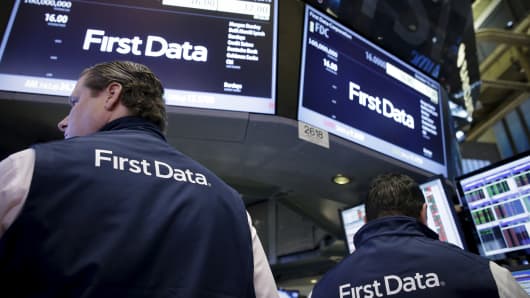The biggest IPO of the year, FirstData, made its debut on the New York Stock Exchange Thursday morning at $16 per share.
However, it wasn’t without a hitch.
Wal-Mart’s Wednesday announcement about disappointing earnings and sales sent shares plummeting. In turn, FirstData priced below its target of an $18 to $20 range and Albertson’s indefinitely postponed their planned IPO.
So what does this rocky patch mean for the broader IPO landscape as other big names attempt their own debuts?
“I think one important thing to know is the market is actually operating,” Kathleen Smith of Renaissance Capital told CNBC’s “Fast Money.” “We have seen times when the market totally shuts down so the positive news is deals are getting done.”
Other industry analysts point to a focus on market volatility.
“When you have increased volatility in the market, nearly always you have fewer IPOS,” said NYSE Group President Thomas Farley
While the NYSE has seen 14 of the 15 largest IPOs since 2010, Farley told CNBC’s “Squawk on the Street” he’s feeling the pressure to get U.S. listings numbers up. This year, U.S. listings are at $30 billion, half of what the exchange had last year.
“What gives me comfort, however, if you look at the companies that have gone public, whether it’s Pure Storage last week, Performance Food Group two weeks ago, not only are they having smooth IPOS here on the New York Stock Exchange but their stocks have performed very well,” Farley said on Thursday. “They’re both up 20 to 25 percent in the aftermarket.
J.D. Moriarty, head of Bank of America Merrill Lynch’s equity capital markets told CNBC’s “Squawk Alley” there’s one commonality across these recent IPOs.
“The typical IPO is a small-cap product and these are all, generally speaking, larger cap companies that typically withstand the IPO market swings a bit more and can push forward,” he said.
Moriarty said that IPO performance might be more about investor confidence than the actual state of the market and that companies should be more conscious of the swing investors have seen.
“We all tend to track the VIX,” he said Thursday. “But more meaningful is the move the indices have had since that July 20th peak to really the end of September….”
“For our investor clients to buy new deals, they have to be comfortable with that which they own.” Moriarty added. “The base of our buyers is just not as deep and that’s the issue.”
David Solomon, co-head of the Investment Banking Division at Goldman Sachs echoed Moriarty’s sentiments on Thursday’s “Squawk Alley.”
“Ten out of 11 of the last IPOs in the last three weeks have priced below the range and they’ve traded up just slightly,” he told CNBC. “So investors are asking for a bigger discount to move forward right now in the IPO market and that’s leaving a number of deep deals to potentially wait until the market environment is a little bit more inviting.”
Despite the less-than-inviting market, financial technology start-up Square filed for an IPO Wednesday.
Square proposed operating under the ticker symbol SQ for an offering price of $275 million, according to the filing.
But the question on investors’ minds is: Will Square be able to keep up with its private value of more than $6 billion?›
“We did see a couple of companies go public last year, Hortonworks and New Relic,” Moriarty said. “They went public at lower values than their private valuations and those have worked for public investors. And perhaps that’s a page out of the playbook that Square has decided to move forward with.”
Despite these examples, Smith said Square is facing a very high risk.
“With Jack Dorsey being co-CEO of both, that’s a big issue,” she said Thursday. “It seems fairly unlikely that Square will be able to come to market at anything above, even maybe, close to that last round of 6 billion.”
Moreover, some investors might compare FirstData’s shaky debut with Square’s upcoming public offering.
However, Moriarty said while FirstData and Square are part of the same payments ecosystem, they have very different investors. What will be more contributory to Square’s IPO, he added, is the class of IPOs that have occurred after Labor Day and how they perform as a group.
Solomon said it’s also important to think long term for company value.
“Remember also that when companies go public, often they’re selling a small piece of the company, sometimes or often they’re bringing in just primary capital to reduce debt or rearrange their capital structure and most of the value is created as that company performs as a public company in the future not just at the moment of time of the IPO,” Solomon said.
The already shaken IPO market will face a European contender next week. Ferrari is expected to debut on Wall Street this month. The Italian luxury carmaker expects its U.S. IPO to be priced between $48 and $52 per share.
[“source -cncb”]





